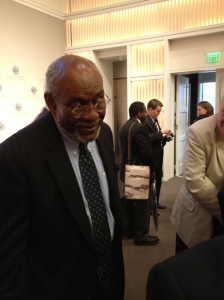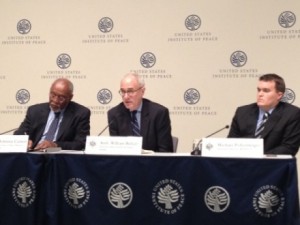Blog Archives
US Government: LRA Mission Is In ‘National Interest’, Not ‘Strategic Interest’
The recent deployment of US troops to help with the hunt for Joseph Kony is of no strategic interest to America, but is in the country’s national interest.
That’s the view of Assistant Secretary of State for African Affairs Johnnie Carson, who was speaking at the United States Institute of Peace on Wednesday as part of a discussion on US policy towards the LRA.
 Asst. Sect. Carson after speaking at the USIP
Asst. Sect. Carson after speaking at the USIP
Around 100 American soldiers are in the Central-East Africa region advising regional forces on how to track the LRA.
Mr Carson was particularly keen to scotch any ‘conspiracy theories’ that the mission is for any other reason than to stop the rebel group’s nearly three-decade long reign of terror.
Malcolm Webb reports for al-Jazeera on the US deployment
His full address can be read here, but these are some of the highlights:
- Anti-LRA legislation in the US is down to the activism of young people
- Joseph Kony will use any chance to kill and abduct to replenish his forces
- “this is not an open-ended commitment”, there will be regular review of US troop deployment to C. Africa
- US troops are “sensitive to the challenge of civilian protection
- 2 US personnel are working with MONUSCO, the UN mission in the region
- There is no military-only solution to the LRA problem
Another revealing point was that Mr Carson felt that should Kony be captured, he should be tried in a Ugandan court rather than at the International Criminal Court.
This is a legacy of America’s decision not to sign up to the ICC, whose first arrest warrant was for the LRA leader.
Also speaking on the panel were William Bellamy, the director of the Africa Center for Strategic Studies, and Michael Poffenberger from Resolve (see his take on the event here).
 The panel (L-R): Johnnie Carson, William Bellamy, Michael Poffenberger
The panel (L-R): Johnnie Carson, William Bellamy, Michael Poffenberger
Mr Bellamy wondered if this operation was America getting over its “Black Hawk Down syndrome” and welcoming that if it is.
He also raised concerns that the US might pull out prematurely if results were not seen quickly.
Mr Poffenberger provided perhaps the most frank statements of the day.
He argued that the LRA do not feel under any imminent threat, citing evidence that temporary homes had been built for senior LRA commanders to stay in for up to a month at a time.
While thanking the Obama administration for its actions so far, he warned that the job has not nearly been finished yet.
But perhaps the most striking point from the Resolve director was that Kony has already outlasted four US Presidents.
Interestingly, the panel were reluctant to discuss the possibility of using drones to target Kony, although Assistant Secretary Carson did mention that the terrain where Kony is hiding out would make that difficult.
Watching all of these remarks was a large audience including ambassadors from the countries in the affected region.
Ambassador Stanislas Moussa-Kemble from the Central African Republic nodded solemnly as Assistant Secretary Carson described the atrocities the LRA are committing in the area.
I managed to grab an interview with Ambassador Dickson Ogwang from Uganda on what he thought of the US deployment:
Dickson Ogwang talks to Adam Bearne about the US troops
When politicians talk about the LRA, even if they are slightly misinformed, I usually welcome the attention being given to the crises.
This event was even more important as it was the highest-level State Department commentary on the LRA crisis since the US legislation was passed.
